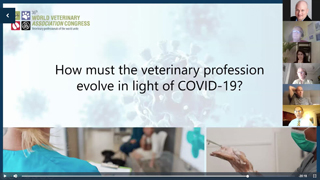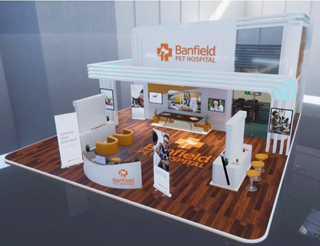Through webinars and video calls, event organizers quickly recast veterinary meetings

COVID-19 Panel WVAC 320

Screenshot from World Veterinary Association Congress
The final session of the World Veterinary Association Congress in May featured a live panel discussion of COVID-19 and the veterinary profession. Panelists appeared via web cams on the right side of the image.
Dr. Anna Smith bought a plane ticket to the Greek island of Rhodes in February and renewed her passport in March. Even as SARS-CoV-2, the coronavirus that causes COVID-19, popped up in new locations around the world, the veterinarian in Northern California hoped she'd be able to attend the International Society of Feline Medicine (ISFM) European Congress in June. A manager at a feline-only practice, Smith was eager to experience both a cat-centric conference and Greece for the first time.
By late March, more than a half million people had been diagnosed with COVID-19, and the World Health Organization called it a pandemic. Governments around the world restricted travel, and citizens were encouraged or ordered to stay home. Large gatherings, known as superspreading events, were advised to cancel.
On March 23, ISFM called off the in-person meeting and announced it would instead host a virtual international conference in August. “I was super disappointed about the cancellation since I was really looking forward to the trip,” Smith said. “But also worried about exposure to the virus, since I just started an immunosuppressive medication. So, mixed feelings.” She hopes to attend the next meeting in Rhodes, if it goes ahead as planned, in 2022.
As in so many professions, dozens of veterinary conferences, congresses, forums and meetings in the U.S. and beyond have been canceled or postponed. For veterinarians hoping to earn continuing education (CE) credits required for licensing, to network with colleagues, and to hang out with friends in places such as San Francisco, Spain or New Zealand, the closures add disappointment to a season of challenges.
However, not all conference organizers simply postponed to next year. Many quickly rolled out, or are in the process of rolling out, online versions of events. Along the way, they are discovering that while some things are lost in the conversion, other things are gained.
Matching an on-demand model to unpredictable times
Veterinary boards relax CE rules
The reaction time for people planning conferences in April was especially tight. The British Small Animal Veterinary Association Congress, for example, expecting to draw more than 7,000 people, was slated for April 2 in Birmingham, north of London. BSAVA canceled on March 13.
"Although the government had not announced any restrictions on large gatherings, it was clear to us that the event would not be able to take place in the first week of April and we wanted to give speakers, delegates and exhibitors clarity on this," Amanda Stranack, BSAVA CEO, said in an email to the VIN News Service. "It was devastating to cancel an event that staff and volunteers had been working on for 18 months but there was no doubt in anyone's minds that it was the right thing to do."
Stranack said BSAVA worried about the impact of calling off an event that offered more than 450 hours of continuing professional development. (Known as CPD, it is the U.K. equivalent of what the U.S. calls CE.). The loss was compounded by the cancellation of other, smaller conferences, she said. Almost immediately, the association started exploring options for providing material online.
"Our speakers' circumstances varied enormously, with some of them working flat-out as a result of COVID, and others on furlough. We knew that it wouldn't be possible for them all to be available within a fixed time period," she said. The same held true for many BSAVA members and the Congress's wider audience.
So the organization decided to offer some event content via recordings provided through an in-house platform that it already uses for online courses. The modified virtual conference, known as Congress On Demand, went live on May 18. The cost for full proceedings is £180 (US$227), or £120 (US$151) for members (with content available through the end of the year). In contrast, registration for the four-day, in-person event started at £486 (US$612).
BSAVA recognized that one constituency potentially harmed by the cancellation would be individuals hoping to present recent research, such as interesting cases or new treatment techniques, according to Stranack. So the association hosted 49 "abstract sessions" online May 14 and 15, which drew an average audience of 160 per session.
By comparison, at the in-person conference last year, 123 abstracts attracted an average audience of 20 each.
"As people know, abstract presentations at congresses are not always the most popular sessions to attend," Stranack said. "This [online presentation] was certainly the largest audience BSAVA abstracts have ever seen, and we were delighted."
From live to virtual in weeks
The World Veterinary Association, an organization representing 95 veterinary medical associations around the world, transformed its annual conference into a virtual affair in fewer than five weeks. Originally, the WVA Congress was to take place in Auckland, beginning April 6. In mid-March, the event host, the New Zealand Veterinary Association (NZVA), canceled the gathering after the national government closed the country to nonresident visitors.
On April 26 in New Zealand, an online version kicked off. It featured a mix of live-streamed panel discussions and on-demand webinars (providing more than 100 CE hours), made available over a three-week period. All conference content is available to registrants until Oct. 25.
How did organizers pull off the switch so quickly? WVA Executive Secretary Dr. Zeev Noga explained that because the physical conference was canceled so close to the event date, local organizers figured many presenters had already prepared or started to prepare their presentations. "It was decided to approach all of them [to go online]," he said. "Most of them agreed."
They also tapped outside experts. NZVA hired The Webinar Vet to organize and prerecord presentations and run live, interactive sessions. Based in Liverpool and founded by a veterinarian, The Webinar Vet has been creating web-based continuing education for a decade.
The online conference reached many more people than would have been possible had the conference gone ahead in Auckland. Noga said more than 7,000 people registered for the online event, whereas 1,300 registered for the physical conference. The reach of some presentations may be even greater, since WVA and NZVA decided to make keynote sessions on climate change, horse and donkey welfare, and COVID-19 available to the veterinary community for free.
All the same, don't expect Noga to push for virtual-only events in the future. While the organization will explore possibilities to offer virtual sessions during physical congresses, he said: "We still believe the in-person meetings are important for connections and networking, and where informal chats translate into concrete actions. This is something that is very difficult to replace online.”
BSAVA's Stranack agrees that virtual experiences can't replace the real thing. "Working in veterinary practice can be quite isolating, and Congress provides a way of seeing and experiencing the wider profession, which is something people can be proud to be part of," she said. "It is also an opportunity to step out of the routine of day-to-day life, and reflect a little and have a lot of fun while you are there. For these and so many other reasons, we feel virtual events will never replace face-to-face events entirely."
More virtual conferences this month and beyond
If not for the pandemic, the European Veterinary Emergency and Critical Care (EVECC) Congress would have convened today in the medieval city of Ghent, Belgium. Instead, the Congress will be presented on June 25-28 as a series of live-streamed online lectures with opportunities for audience members to ask questions. Hosted by the Veterinary Information Network, an online community for the profession and parent of VIN News, the presentations also will be available to participants as recordings.
Céline Pouzot-Nevoret, chair of the central organizing committee for the Congress, said EVECC was following the example set by other veterinary societies that had gone online after canceling. She said she hopes the virtual event will allow ECC practitioners, veterinary team members and students to have access to high level CPD anyway, and help EVECC offset some financial losses from cancellation of the physical event.
On June 10, the American College of Veterinary Internal Medicine launches an on-demand version of its canceled forum, originally slated to begin that same day in Baltimore. The virtual event will feature 70 recorded sessions, at least 60 CE hours, and access to more than 300 research abstracts through the end of the year.
Organizers of other canceled meetings will provide some version of their gathering virtually. They include the European College of Veterinary Surgeons Annual Scientific Meeting (Valencia, Spain, July 2), the American Veterinary Medical Association Convention 2020 (San Diego, July 31), and the European College of Veterinary Internal Medicine (companion animals) Congress (Barcelona, Sept. 3).
An events status list is available to VIN members here.
Stopgap for lost networking opportunities
Banfield Virtual VMX 320

North American Veterinary Community photo
Banfield Pet Hospital will have a virtual booth at the VMX Virtual Job Fair in July.
Lost opportunities for job seekers and employers are conference staples that aren’t addressed with live-streamed panels and recorded presentations. The North American Veterinary Community (NAVC), which puts on the VMX Veterinary Meeting and Expo in Orlando, the largest veterinary meeting by attendance in the world, is aiming to help bridge that gap with a virtual job fair on June 24.
"Nothing can replace face-to-face, we know that,” said Manolita Moore, NAVC vice president of exhibit sales and operations, during a video chat with VIN News. “But we are hoping that this will be as close to it as possible."
NAVC's readiness to offer what it describes as a "highly immersive and unique 3D" job fair this summer seems like uncanny timing, but the truth is that Moore began shepherding VMX’s move into cyberspace last year, and was thinking about cyber events long before that. "I was quoted talking about virtual back in 2011 in Trade Show Executive magazine," she said.
Moore began in 2019 to work with Simulocity, a technology company in Florida, to create a virtual expo for VMX. The online event debuted in January, and was offered as an adjunct for those attending the physical event in Orlando, which was one of the last large veterinary conferences to take place before COVID-19 shutdowns. Moore said about 700 of the 18,000 expo participants registered for the virtual version at the expo, and 300 have signed up since then. It remains active until the next expo.
Don't expect avatars and lifelike settings like you'd find in a sophisticated video game. A brief demo of version 1.0 seen by VIN News shows three-dimensional expo booths with click-on videos, pop-up windows, and opportunities to chat. Users can also search for companies, products and vendors via a Netflix-style menu. The platform uses low-bandwidth, 3G-cell technology that works on a phone or tablet.
Version 2.0, to be released soon, will be more elaborate, Moore said. It will include an education center featuring on-demand CE, as well as live and prerecorded meetings and presentations available during future VMX events.
The VMX Virtual Job Fair is a slice of the virtual expo. It will feature employer booths belonging to Banfield Pet Hospital and VCA Animal Hospitals, two veterinary clinic chains owned by Mars Inc., the largest owner of veterinary practices in the world. Also participating are Petco, which has veterinary clinics in some of its pet stores, and NAVC Retriever, a recruiting app for the profession. Moore said other veterinary clinic groups and independent clinics are welcome to participate if they are hiring and purchase a virtual booth. The event is free to job seekers.
VMX plans more virtual events and job fairs during the year.
As for the January 2021 expo, Moore said, "We expect and are preparing to have a hybrid event."
Some events scheduled well before next winter have not announced changes to their plans for a physical conference. ExoticsCon in Denver in late August, and the Veterinary and Critical Care Society conference, in St. Louis in mid-September, remain on track.
All 50 U.S. states and many countries have relaxed some restrictions on movement and are allowing businesses to reopen. However, large gatherings are still widely discouraged.
The difficulties stretch well into 2021. WVAC's Noga said his organization is confronting obstacles working on its April convention in Taiwan. "Sponsors, speakers, delegates face difficulties engaging themselves in something when no one knows what will happen," he said. “For the time being, the situation is not clear, and we are preparing to adapt ourselves for future challenges.”
Correction: The date the WVA Congress was originally scheduled to take place has been corrected to April 6.